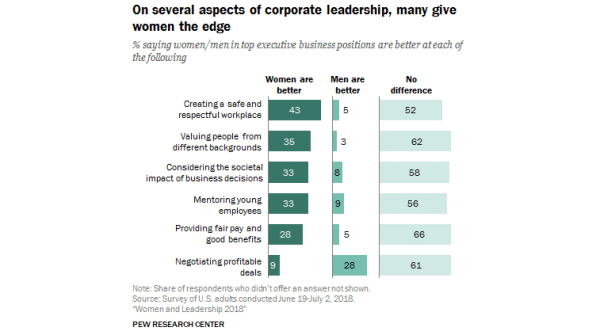Study: Women rank better than men at these leadership traits
A new Pew study tells us something we already know here at Fast Company: Women make good leaders! In fact, they actually rank higher than men do for a number of leadership traits, according to the study—though you wouldn’t know it from their paltry representation in leadership roles.

Of the 4,587 people surveyed, 43% said women in business were better at creating a safe and respectful workplace, while 35% said women are better at valuing people from different backgrounds; only 5% and 3% of respondents, respectively, said men were better in those areas.
In politics, 61% of respondents thought women leaders were more compassionate and empathetic, and nearly one-third felt women were more ethical. A significant number of people (43%) claimed men and women in business and politics did not have particularly different leadership styles. Of the people (57%) who did think their styles varied, about 62% felt neither approach is necessarily “better.”
The two qualities men ranked higher on were “being willing to take risks” and “negotiating profitable deals,” in terms of politics and business, respectively.
Of course, men still dominate the leadership ranks of business and politics. Though this year has seen a record number of women running for seats in the U.S. House and Senate, women currently account for just 20% of Congress. In the business world, those numbers are even more skewed, with only 25 women at the helm of Fortune 500 companies.
The reasons for this are not surprising. Nearly two-thirds of adults surveyed by Pew pointed to the fact that women have to work harder to “prove themselves,” and half cited the gender discrimination faced by women. About 45% felt Americans weren’t ready to elect or hire women leaders, while 38% thought sexual harassment was a major impediment for women.
All of which means that people continue to view male and female leaders differently—and that still hurts women, regardless of what the numbers may tell us.
(24)



